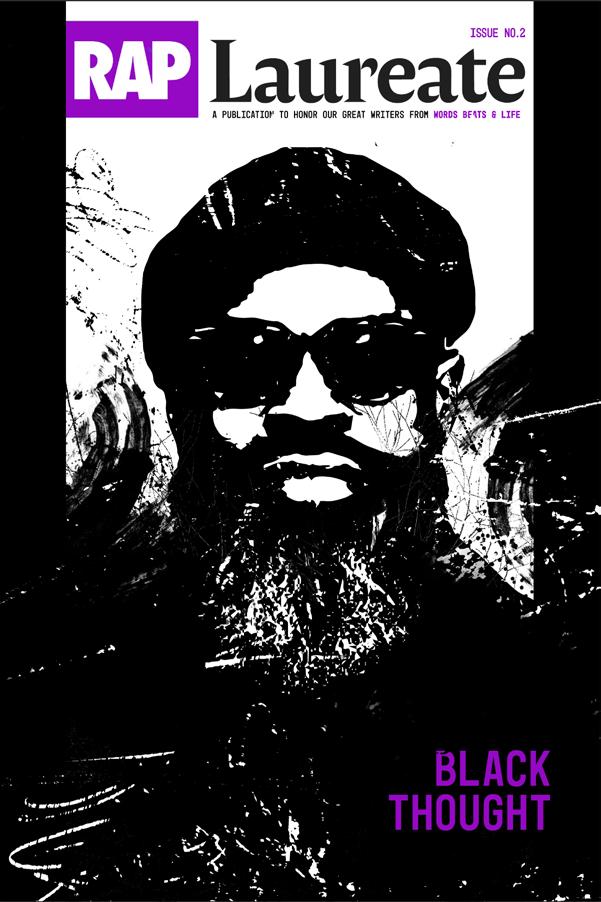

Author Credits:
Dr. Jason Nichols
Mikal amin Lee stan "substantial" Robinson
chief editor: Mazi Mutafa
copy editor: Asad "ultra" walker
design & art by: Ali Hussain



table of contents 05Black Thought 09Thoughts Rising 13Political Thought 23Streams of Thoughts 33Book Review
It is an honor to acknowledge the multiple decades of work by our second annual Rap Laureate. Black Thought has been an underrated MC for much of his career as a member of the Legendary Roots crew, an amazing and unique live instruments-based hip-hop band in a genre defined by sampling and drum machines. For a time their uniqueness obscured the average listener's ability to balance the contributions of the lead MC.
Over time though, as he began to branch out to make work more in line with traditional methods of making Rap music, his skill became undeniable. From his appearances on important terrestrial radio platforms to the solo mixtapes and albums, his work continues to demonstrate why Black Thought is your Favorite MC’s Favorite MC.
His skills are undeniable and deserve a deep dive from hip-hop scholars, fans, and educators to bring his words and experiences into your lives and those who matter to you. For that reason, this issue of the Rap Laureate includes a review of his memoir, “The Upcycled Self.” It also includes a biographic review of his life based on his music, past interviews, and information available to the public. Finally, we have a lit review of his contributions to the canon of hip-hop masterworks in the form of his music.
We hope that this issue shines the appropriate light on his contributions and inspires the reader to delve deeper into the works of this master wordsmith. Return to the first album, find the features, watch, listen, and read past interviews and his memoir. It’s all worth your time and effort to glimpse the places, events, and people that made Tariq Trotter the MC we know as Black Thought.
Mazi Mutafa executive Director Words Beats & Life
Black Thought
2024 RAP LAUREATE

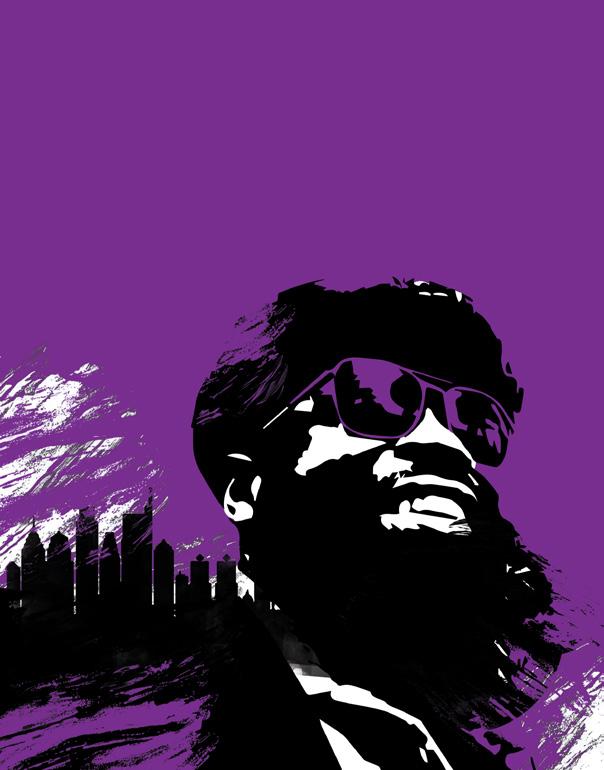
black thought
RAP LAUREATE • words beats & life 05
Philadelphia is known for being a city of the underdog, the unsung and the unheralded. Its cobblestone blocks are an enduring symbol of its importance to American history and culture. Despite its massive size, Philadelphia often gets swallowed up in the shadows of the skyscrapers of its neighbor to the north. So it has branded itself a fighting town, a home of unlikely heroes who use their hearts and fists to escape the rundown row houses and tight alleys that have swallowed up so many lives. Many people know Sylvester Stallone’s fictitious character Rocky, who famously sprinted up the steps of the Philadelphia Museum of Art, or Smokin’ Joe Frazier, the undersized heavyweight who sent the giants of his era to the canvas. Black Thought is another traditional Philly underdog. If the world thinks of Rocky running triumphantly up the steps of the Museum of Art as an iconic Philadelphia moment, they should imagine Black Thought running out the museum’s doors, exposing the globe to the best of Philadelphia’s art scene.
Tariq Luqmaan Trotter, also known as Black Thought, was born on October 3, 1973, the same year many use as a start date for hip-hop culture. His humble beginnings read like a Greek tragedy. Young Tariq lost his father, Thomas, to the rugged streets of Philadelphia. Thomas was a member of the Nation of Islam, but also a member of a closely aligned infamous organized criminal outfit often referred to as the Black Mafia. Most remember Thomas as kind and chivalrous, but he was also dangerous and feared in his Germantown neighborhood. Thomas Trotter’s body was found in an alley in Germantown. Tarik is still today learning tidbits of information about his father from people who knew him on the streets. The death of his father was tragic, but Tariq still had his mother, stepfather and older brother in his corner. That was until one day young Tariq burned some of his toy army men to make them appear as though they were casualties of a brutal war. A fire started in the house. Tariq’s older brother accused the firemen of stealing some of the family’s valuables and carelessly breaking the family’s modest belongings. An altercation ensued and Trotter’s older brother was placed under arrest. This moment would precipitate a spiral of trouble with the criminal justice system for Trotter’s brother for the remainder of his life. Trotter witnessed the disregard institutions had for the humanity of racially and economically marginalized people and it would have an influence over his future art.
However, art was Tariq Trotter’s escape both psychologically and physically from the challenges of his impoverished Philly neighborhood and difficult upbringing. His mother would send him to art camp at the idyllic Fairmount Park. Though only a relatively short distance from his home turf, the tree-lined park felt worlds away from the cracked concrete of his neighborhood. Trotter called his Saturday art classes and summer art camp his “saving grace.” From a young age, art was the key to a new safe environment and a psychological refuge from his surroundings, which included poverty and the incarceration and addiction of loved ones. He eventually landed in the Philadelphia School for the Performing and Creative Arts where he would meet Ahmir “Questlove” Thompson, a drummer and son of a doowop singer. Tariq Trotter’s lyrical mastery is an embodiment of James Baldwin’s famous quote, “the only real concern of the artist, [is] to recreate out of the disorder of life, the order which is art.”
black thought 06

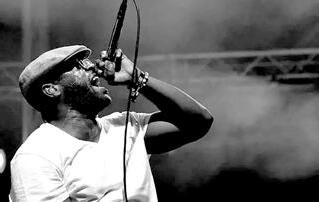
In his lyrics, Black Thought sometimes compares his microphone to a weapon. He states that he will use it to “slap you in your face” and that he will pull it out comparatively “on any pistol brandisher.” Trotter understands the power of art and is a modern-day art warrior, battle tested on the rugged terrain of Philadelphia. He also understands that, much like a weapon, the microphone has helped him save his own life and prevented him from suffering a similar fate to those who were “slain on the train… for wealth.” While Trotter refers to the microphone as an offensive weapon, it has also been a shield.
Trotter found what many artists need for growth and maturity as creators. He found community, beginning with his close childhood friend, drummer Questlove, with whom he would perform on the sidewalks of Philly’s famed South Street. Later his community would grow to include his other Roots bandmates and fellow emcees like the late Malik B and regular collaborator Dice Raw. As an emcee, Trotter’s development eschewed many of the growing conventions in hip-hop. Instead of finding a DJ to spin records, he had a drummer and other live instruments. At a time when the emcee began to capture top billing away from the DJ, Trotter was a solo emcee for much of his career in a band whose name did not highlight his. Hip-hop is an artform and culture that was born out of poverty and a lack of quality arts instruction and education. As a result, young people innovated new ways to express themselves musically and repurposed existing technology into instruments. The Roots became the first to blend jazz band traditions with classically trained musicians and hip-hop’s cutting-edge vibes and lyricism. They combined their inner-city Philadelphia roots,
a place that was home to hardcore traditional hip-hop collectives like Three Times Dope, the Tuff Crew and the Hilltop Hustlers, and their relatively exclusive art school background to create something not yet seen in hip-hop. Trotter second-guessed this plan in the early days, but ultimately decided to defy convention, as true artists often do. While many emcees of his era rapped about the struggle of ghetto life and being witness to death, drugs and destruction, he often rapped about universal themes like love and lazy afternoons. Trotter had been through suffering, after the brutal stabbing to death of his mother, Cassandra Trotter, who battled addiction and had a family history of street activity. He was robbed of an opportunity to have a father figure by Philadelphia’s violent underworld. Trotter also had a brief stint dealing crack cocaine himself. Yet, Trotter always used art as an escape rather than as a cathartic mechanism. Trotter at times wrote conspicuously about his love for art itself, discussing his bona fides in the Philly graffiti scene and his love for hip-hop. He felt no need to specifically boost his street credibility, only his artistic one. At the same time, he never flaunted his success or over-romanticized his wealth. He was the consummate band leader and musical artist. Trotter and The Roots were known for maintaining a tireless touring schedule that would have exhausted the most spry young rapper. In essence, he never did what they did.
Black Thought is one of the most intriguing names in hip-hop. For many, it encompasses images of Walter Rodney, W.E.B. Du Bois, John Henrik Clarke and Frantz Fanon. But Trotter didn’t call himself “Black Thinker.” His moniker implies that he embodies the thought itself. Black Thought actually says the name came
RAP LAUREATE • words beats & life 07
from his experience as a visual artist rather than extensive reading of Black philosophy. He sees his multifaceted style as a vocal representation of the sum of all colors. Thought’s lyrics are packed with slant rhymes to go along with his deep baritone, making him a sort of vocal percussionist and profound lyricist all wrapped in one. Though he is known as Tariq for the Jimmy Kimmel Late Night audience, for his core hip-hop audience he has saved the name Black Thought.
Black Thought is more than just the prototypical rapper’s rapper. He is an artist’s artist. Throughout his career, he was rarely mentioned in Top 5 emcee lists despite rhyming alongside lyrical geniuses like Eminem, Big Pun, Pharoah Monch and Common and never getting outshined. He is the typical underdog from “wild Iladel-foul Pennsy.” Pennsy was the name for Philadelphia that Black Thought heard after an encounter with police. He has walked his own path, which has led to a career that has spanned four decades.
Black Thought has taken artistry seriously since childhood. Like most artists, he values originality and nonconformity. He has rapped about clones, but this Philly fighter has none. True originality is when no one copies your style because no one can. Rocky used his fists to escape the common pitfalls of poverty and instead inspired his city and the world. Thought fittingly used his mind to achieve the same ends. However, both used their hearts to continue to fight despite the odds against them or the pain and loss surrounding them, and let the entire world know about the City of Brotherly Love.
Jason Nichols
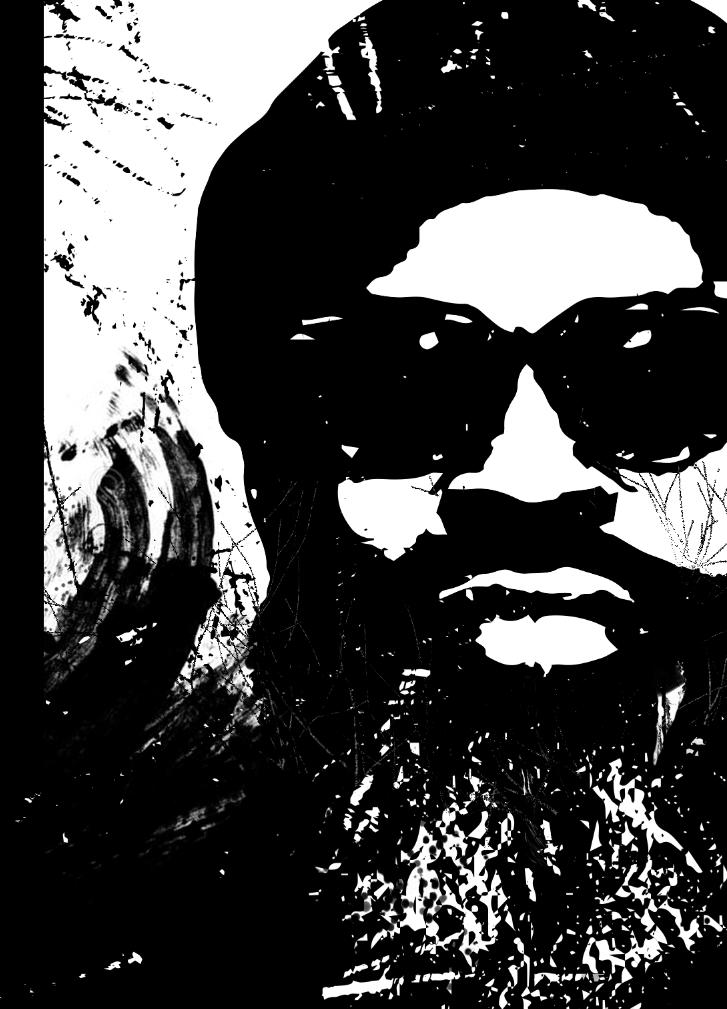
black thought 08
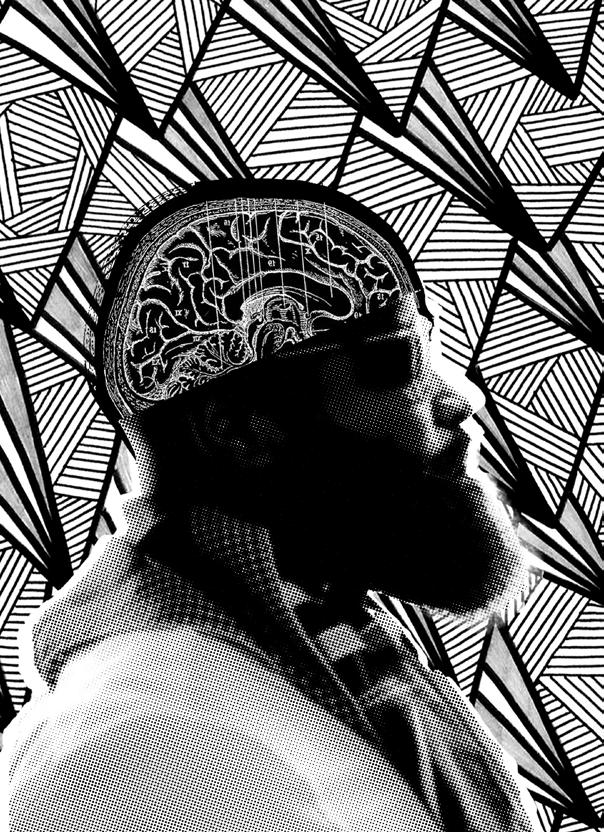
Thoughts Rising
RAP LAUREATE • words beats & life 09
From a musical and technical perspective, by the time Game Theory dropped, The Roots and Tariq’s abilities were undisputed. Over the previous decade, as the main voice of The Roots and co-general along with Questlove, he was very much the face as well. If, by that time, anyone had doubts over whether or not Black Thought should be in a Top 5 conversation, from 2006 to the present he has ensured there can be no debate. At last count, Thought has been the principal emcee for 20 combined Roots and solo projects, six of which have occurred in the last six years! On longevity alone, Thought stands out amongst his peers. When you consider that his career can now be looked at as including both principal emcee in a group and solo performer, the pool of artists who can boast the level of success he has had becomes even smaller.
black thought 10
From the outset, The Roots crew stood out from the Hip-Hop landscape as being a “Hip-Hop jazz band.” While that label and ideal still held true, their sound became subtle but with distinct evolutions occurring in their sound and style. Similarly, as a writer Thought began to grow in his ideas, and his literal thoughts on wax grew as well, while continuing to show the lyrical ability that set him apart from other emcees. As a technician, Thought had a flexibility and range that were unfuckwittable — from his amazing rendition in both style and execution of other rap legends on BOOM to features with Big Pun, Thought had put himself in the conversation as one of the greats, if not the GOAT. Certainly, amongst his contemporaries he had few peers. However, a critique or argument against that status often pointed to his (lack of) range of topics, and the content and level and depth of his storytelling. It’s in this phase of his career, loosely beginning with “The Tipping Point,” that we start to hear a maturation within Thought’s voice. While glimpses of his depth can be heard on “Phrenology” and even as far back as “Things Fall Apart,” his projects beginning in the mid-aughts found a maturing Thought entering territory on wax that he hadn’t previously explored. The master had begun to fully bloom.
This trajectory wouldn’t seem extraordinary if Thought was a horn player or a keyboardist or even a singer. After all, with experience and time, a master’s craft can only deepen if they are disciplined and apply themselves. However, this is Hip-Hop and few groups, let alone emcees, have the type of longevity and sustained run of quality that
Thought and The Roots can boast. Thought first appears on Organix, The Roots’ “debut” album in 1993. By the time he was the frontman on Game Theory 13 years later, he’d already amassed six full-length albums, two EPs, a live album and tens of thousands of hours performing and touring as The Roots’ principal emcee. The Roots continued to release music even as they became the “Late Night” band for Jimmy Fallon as well. When carefully looking at and listening to the additional four albums during this period, it shows no let-off with Thought or The Roots in terms of imagination, skill or innovation. Then, beginning in 2018 he would go on to release five additional solo projects (with at the time of this writing a sixth to be released with Madlib as the lone producer). The degree of writing and quality that these later projects have only further distanced Thought from his peers and highly elevated his GOAT rating.
It’s hard to argue against the level of dual catalogs as both group member and solo artist that Thought now occupies. It’s one thing to shine within a group dynamic, but following that up with a solo career that stands on its own and in the case of Thought demonstrates finding a new level to their talent is frankly another realm of reality altogether. From an arts conservatory student from the South Side of Philly to a 33-year-old world-traveling artist, beginning at Game Theory, who’s been able to maintain being at the top of their field, it only makes sense that they would have expanded the range and depth of
11 RAP LAUREATE • words beats & life
their musical and lyrical talents. The Roots, and by proxy, Thought, are one of those few Hip-Hop crews who haven’t been lost to bad label deals, bad breakups, getting stuck in a stylistic time warp — or, worse, desperately trying to keep current by sounding like the kids at the moment and often ending up sounding very much like out-of-touch old folks. The Roots have not (at least in their music) become a retired lounge act or a legendary group playing the hits to a graying fanbase. It’s that freshness and awareness that are heard and felt as Thought’s expressions in a sense catch up to the already prodigious ability and talent he showed very early on, like a phenom athlete whose preservation of their natural physical ability and talent stays peak long enough to marry the knowledge and experience of the game with it, to reveal an unstoppable force. While 2006 couldn’t be considered his peak, it marks the start of Thought’s rising.
From 2006 to the present, Thought’s evolution in the second phase of his career can be broken into two separate suites of records that also can be partitioned between Roots and Thought solo records. Game Theory, Rising Down, How I Got Over, Undun and And Then You Shoot Your Cousin can be seen as the political transformation of not only Thought but the Roots collectively. These records reflect a maturing voice from an artist looking outward and commenting with clarity and experience on the state of the world they live in and are a part of.
In the next suite, Thought branches out to formally begin a series of solo projects, Streams of Thought Volume 1, Volume 2 and Volume 3, Cheat Codes and Glorious Game. These five projects are an amalgamation of early Thought, and his second act from Game Theory forward. These projects are lyrically dense while continuing the emerging voice of Thought socially, politically and emotionally. Thought as an emcee reflected everyman qualities throughout his career when we think of the subject matter within his songs and verses. Now, within these solo works, which you can trace back even to the early aforementioned suites of records, Thought signals his elevation in thought (no pun intended) and understanding born of the trials, tribulations and living of a hardened street poet.
12 black thought
Mikal Amin Lee
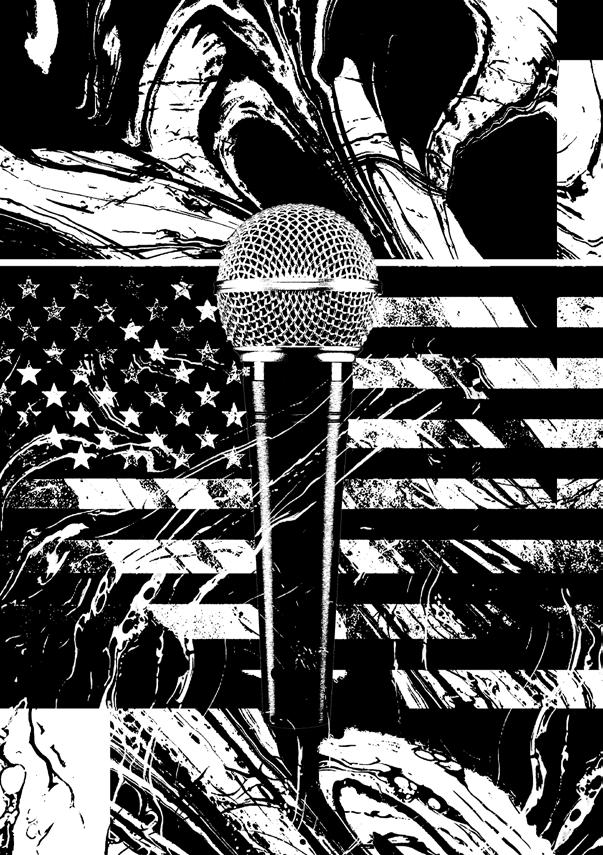
Political Thought
13 RAP LAUREATE • words beats & life
There aren’t many stones you can throw at The Roots or Thought when considering the success they’ve had not just commercially but culturally. Black Thought, by the time Game Theory is released, has earned the respect of at the very least his peers, as evidenced by the multiple guest appearances he received as one example. However, for a section of heads and a few critics, the range and depth of the content was where you’d take marks off, if you wanted to. It would be inaccurate to say Thought wasn’t discussing important issues in his songs. You can find verses and songs on several projects including “Illadelph Halflife,” “Things Fall Apart,” “Phrenology” and “The Tipping Point” that tease his political outlook. Starting in 2006 with Game Theory, however, The Roots demonstrated a concerted effort to have a project thematically voice their ideas, their views and their values. A great example is “False Media,” where Thought’s single verse rant is bookended by an overtly politically charged hook by Wadud Ahmad:
America's lost somewhere inside of Littleton
Eleven million children are on Ritalin
That's why I don't rhyme for the sake of riddling
False media—we don't need it, do we?
Pilgrims, slaves, Indian, Mexican
It looks real fucked up for your next of kin
That's why I don't rhyme for the sake of riddling
False media—
14 black thought
Thought’s usual sharp flow and imagery are apparent, but what stands out is his commentary and critique on the current state of affairs. The beginning of a flailing economy, several years deep into the war on terror and the disillusionment born of a racist America are packed into a sixteen-bar “persona” verse. Taking on the role of President Bush, Thought reads the Commander in Chief using his own voice against him, exposing his hypocrisy and allegiances:
Hey, it's me, the monster y'all done created, I been inaugurated
Keep the bright lights out of our faces
You can't shake it; it ain't no way to swallow the hatred
Aim, fire, holler 'bout a dollar, nothing is sacred
We gon' pimp the shit out of nature
Send our troops to get my paper
Tell 'em, "Stay away from them skyscrapers
Ain't long 'fore you get y'all acres"
I'ma show 'em who the glo-bal gangster
Sentence me to four more years, thank you
I'ma make you feel a little bit safer, because it ain't over—
See, that's how we get your fear to control you
But ain't nobody under more control than the soldier
And how could you expect a kid to keep his composure
When all sorts of thoughts fought for exposure again?
Game Theory at this juncture is probably The Roots’ most overtly political project, with Thoughts’ ideas and voice at the heart of it. As a writer, Thoughts’ first and third person voice prior to that would give broad strokes to issues or bring light to serious problems he observed. Game Theory, however, and “False Media” particularly, is a great example of him addressing current events in a concentrated and direct way.
15 RAP LAUREATE • words beats & life
“Rising Down” is a literal doubling down on the growing disenfranchisement, social awareness and commentary the band begins exploring on Game Theory. Deep in the throes of the Bush Presidency, war, an increase in school shootings and an unsure economy, Thought’s muse lyrically is really the crumbling empire around him:
Between the greenhouse gases, and earth spinning off its axis
Got Mother Nature doin' backflips
The natural disasters; it's like 80 degrees in Alaska
You in trouble if you not an Onassis
It ain't hard to tell that the conditions is drastic
Just turn on the telly, check for the news flashin'
How you want it bagged: paper or plastic?
Lost in translation or just lost in traffic?
Yo, I don't wanna floss; I done lost my passion
And I ain't trying to climb; yo, I lost my traction
They makin' me break, my contents under pressure, do not shake
I'm workin' while the boss relaxin'
Here come Mr. Taxman, he leavin' a fraction, give me back some
Matter-fact, next paycheck, it's like that, son
I'll fuck around and have to hurt a few men
They probably chalk it up as a disturbing new trend—Hello!
16 black thought
What’s interesting about this verse, sandwiched between the two very impressive offerings of Yasiin Bey and Styles P, is that it almost feels like a commentary response to “False Media.” Thought’s imagery and cinematic style, which seemingly were utilized to great effect for braggadocio and almost battle-style verses in the early parts of his career, go through a shift with these albums. If his superpowers were his malleable flow, distinct voice and incredible wordplay, all of these talents are now being honed toward more pressing subjects and content. The maturation of the man gives way to a maturation of his ideas.
Fast forward to his current run of projects, and it may be premature to say we are witnessing his final form but also an elevation of what we hear in the examples shown. Just as in “False Media,” “Thought vs. Everybody” is a one verse diatribe,
except Thought has donned the Infinity Gauntlet and ingested super soldier serum. The song itself is the equivalent of a kung fu master realizing, by combining several forms into a single martial art, their abilities to take on an even more devastating power.
The introduction, a recording of Minister Ishmael Muhammad introducing the Honorable Minister Luis Farrakhan as “the most powerful Black man” in the world today, feels like an omen of what we are about to witness — and it is. Thought’s tirade, an onslaught against modern tyranny, brings a controlled rage, not unlike Farrakhan or a peak Malik el-Shabazz in the form of a verse:
17 RAP LAUREATE • words beats & life
Communicating in higher forms than Viacom
To dialogue before the roar of the riot horn
I wonder on which side of the lines I belong?
Lady Liberty face full of concealer
I'm half Masta Killa and half Hugh Masekela
Latrophobia, that's a fear of the healer
Kaepernick is an activist, y'all in fear of the kneeler
Everything's obtuse, nothin' is obscene
Another young life was lost on live stream
Another great fell from grace in high esteem
Then the clock struck thirteen, we in some kind of dream
First I'm handling first things, decipher what it means
To a planet of earthlings, where the question remains
Am I a journal or journalist? Herbal eternalist
Olympic tournament level genius author, affirmative
Though turnin' back and returnin', I'm not concerned with it
The permanent ink paved the way out the turbulence
My hands against the wall outside a billiards hall
I hear police discussin' whether to try and kill us all
I questioned if that'd matter, life is like a tree that falls
In the woods, even with iPhone footage to see it fall
Great men chose the Papermate Pen or State Pen
The firin' pin of a pistol aimed at a playpen
We go from musket to a missile to a revelation (Everybody, every goddamn body)
Another young life was lost on live stream
Another great fell from grace in high esteem
Then the clock struck thirteen, we in some kind of dream
First I'm handling first things, decipher what it means
To a planet of earthlings, where the question remains
Am I a journal or journalist? Herbal eternalist
Olympic tournament level genius author, affirmative
Though turnin' back and returnin', I'm not concerned with it
The permanent ink paved the way out the turbulence
My hands against the wall outside a billiards hall
I hear police discussin' whether to try and kill us all
I questioned if that'd matter, life is like a tree that falls
In the woods, even with iPhone footage to see it fall
Great men chose the Papermate pen or state pen
The firin' pin of a pistol aimed at a playpen
We go from musket to a missile to a revelation (Everybody, every goddamn body)
18 black thought
Some of our greatest political emcees like Chuck D, KRS-One and even Yasiin Bey have numerous times come with a sledgehammer and rocks to throw at the empire but, to borrow a phrase from Brett “The Hitman” Hart, just in the excerpt of the verse, his “excellence in execution,” the eloquence in the damning of a society and system, is a poetry not even those legendary men can routinely claim. The fact it is on the 2020 record Streams of Thought Vol. 3, almost 30 years into his career, is awe-inspiring, nothing short of an inspiration.
In 2022, it almost felt as if Thought was telling former incarnations of himself to “hold my beer” as the continuing evolution of his commentary married with multilayered skills as a craftsman with a pen only gaining in momentum and strength. “Aquamarine,” one of the singles from his joint venture with fellow maestro Dangermouse, the producer, is set over a haunting anthemic track. The song is in and of itself peak Thought stepping into the personal and the political and sacrificing none of the layered meaning, deep imagery and slickness we come to expect from Thought. Even while waxing philosophic, he brings a cutting edge to aggrandizing himself as an elite emcee:
We go from lira to Libra, from cold water to fever
To World War III from the treaty signed in Geneva
The biology teacher said we used to be amoebas
The neighborhood preacher said we emerged from the ether
We converged from urethra and struck gold, eureka
The morning star Tariq, I was born to be a teacher
Whether scorpion or the frog, the nature of the creature
Is to evolve, though it's the savage beast we truly are
My words should be studied up in Berkley and Juilliard
All my bars is hard as solid gold bullion
My name in the Quran like the kingdom of Suleiman
You done lost your mind trying to call me a moulinyan.
19 RAP LAUREATE • words beats & life
This then sets up an opportunity to qualify his background, highlighting the inequities he endured that are systemic:
'Cause in 2-1-5 where folks fight depression
And wives pack protection, lives lack direction
I'm a king, I'm dipped in God's Black complexion
Survival of the fittest is the natural selection
Now, bear down on the scene like I'm Saladin
The stone courage esteem is aquamarine
You mask how you really feel like it's Halloween
Where they ask how you really feel about my machine
In a class that I'm only in Alien, horsepower like a Mongolian Tryna find soul again
But my thoughts corrupt the files that contaminate the console again
It's a shame, but I cannot complain, though I am not the same
My bandwidth is a canvas cut from His frame
When I present ideas, naked and unashamed
It's handwritten in Sanskrit on a 7 Train.
20 black thought
As he delves into the second verse, he continues his internal investigation that also hints at deeper societal fissures:
I've been through hoodies and sneakers to beepers and record features
Hustlin' nicks of reefer to tusslin' with the Reaper
Sensory deprivation to ultimate synesthesia
Freein' our brothers' keeper from teeth of another creature
Breakin' and enterin' to the theater, the search and seizure
Is the worth of genius, somewhere between Earth and Venus
At her convenience, even non-believers make prayers
Haters and naysayers is buried in cake layers
I take day as a blessing and see the night as a lesson
Twilight is a message for me to write a confession.

21 RAP LAUREATE • words beats & life
And as he continues into the final part of the second verse, he links his reality to the larger evil of the system:
The matrix, a dominatrix seeking to be served
Ever patiently waiting with the demons we deserve
Better be willing to pay with every dream that you deferred
If the vehicle should swerve, learn to lean into the curve
After workin' up the nerve almost equal in size
I walked around with the iron for any wrinkle in time
I pay the piece of my mind for every nickel and dime
But never less than a five and never slept on the job
A killer dumped on your squad, yet never left the garage
When your God was close enough to see the flesh of his eyes
Get to the button and press, it's what the message advised
What's a threat? Behind a mess is where the testament lies.
In “Aquamarine,” building from the examples from the previous records, Thought has rounded his skills into an amazingly powerful critique of the world around him, with a clear self-awareness that reveals a vulnerability that wasn’t on display in his earlier work. This growth and consistency are one of the main reasons behind Thought’s evolution to GOAT status.

22 black thought
Mikal Amin Lee
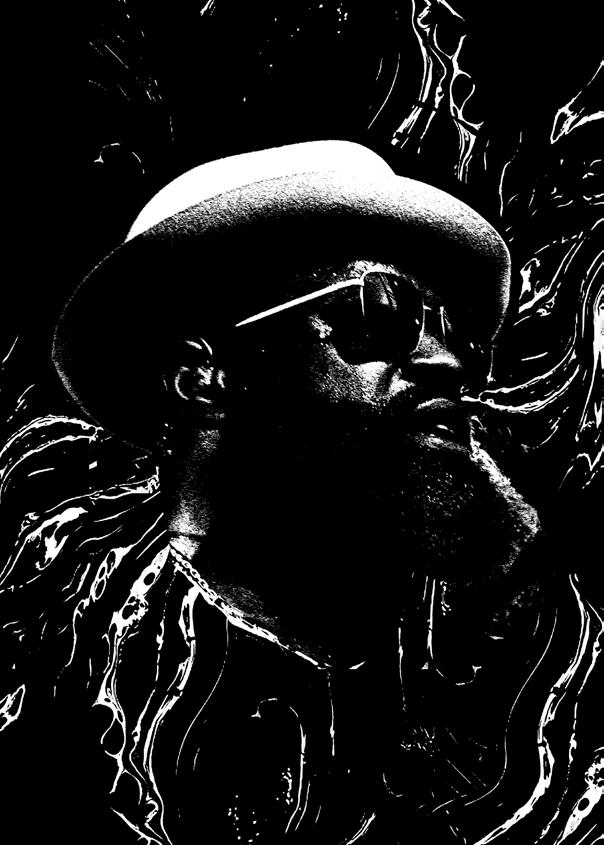
Streams Thoughts of Streams Thoughts of
23 RAP LAUREATE • words beats & life
When we think of truly great emcees, and ones that are considered all-time greats, many of them, if not all, have a few shared traits as far as their abilities are concerned. Without question, though, there is a unique voice and style that stands out and is unduplicated (even if it’s copied or bitten). Kane, Rakim, Jay-Z, Melle Mel, NaS, 3Stacks, KRS, to name just a few, are examples. The level of their lyrical ability, as well, is a tier and a class above, if not innovating and revolutionary. For many you can trace the lineage of whole eras back to what some have done lyrically. Within that, it’s also what they talked about as much as how they talked about it that distinguishes them from their peers. This is where the art of storytelling becomes a true tell of the prowess of an emcee. As descendants and heirs of the African djele or “griot” traditions, emcees, modern-day orators, exist to bring truth, understanding and wisdom through story. What once was a function of royals and rulers — to be entertained and lauded, while also keeping the collective memory of a place and a people — the modern griot does this for the sake and will of the people. If we were tasked to create the anatomy of a legendary emcee, the ability to be an immense storyteller would have to be a major component. Storytelling in fact might be the one throughline trait that legendary emcees, no matter the era, the style or the region, all share.
24 black thought
One of the misconceptions is that Thought wasn’t ever an emcee who told stories or couldn’t be considered someone who did so at a high level. Numerous examples from “You Got Me” to “Lazy Afternoon” show Thought’s ability to be both whimsical and dramatic without diluting the craft that defined him lyrically. What Thought has done, however, since “Things Fall Apart” is demonstrate a diversity, consistency and longevity as it pertains to not just his overall ability, but particularly the art of storytelling, further cementing his status as amongst the greatest to touch a microphone.
Again, some of the most prominent emcees, from Tupac to NaS to even more contemporary contenders such as Kendrick or even J-Cole, understood that to be timeless and to create deep connections requires vulnerability. In telling parts of their story and revealing themselves, they allowed others to find themselves in those stories, along with powerful messages. Thought is no different in that regard. Consider “Radio Daze” from The Roots’ 2010 album How I Got Over, a song featuring Dice Raw, P.O.R.N. and Blu alongside Thought in a loose concept around distraction. Thought’s verse reads like a first person journal entry as he confesses his vices and the toll they’re taking on himself and others around him:
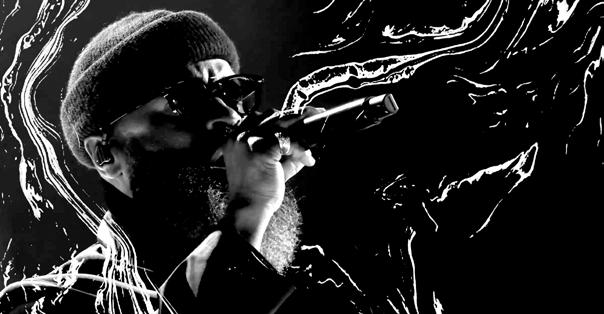
25 RAP LAUREATE • words beats & life
Yo, it's too much strain for nominal gain
I'm going through things; headaches, abdominal pain
Tryna numb it with that Ketel like I'm from the Ukraine
Check the blue flame, lighter running out of butane
What's up with my destructive urge that's unproductive
Choices I'm stuck with, now starting to fuck with Contaminating family and close friends
Telling me to stop burning the candle at both ends
Ain't like I'm on a coke binge, hanging in dope dens
Or life is just a pool of Patron I'm soaked in
The darker the covenant slash trainwreck for you to rubberneck
You ain't felt the true pain yet so you be loving that
Hit me up at black.gov like the government Banana Republican, alien intelligence
Kill switch, real pissed, thinking of some ill shit
The stone the builder refused, he need to build with
Got immunized for both flus, I'm still sick
Via satellite, radio, the realness.
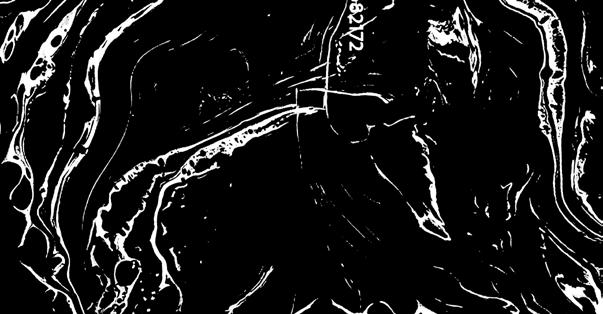
26 black thought
The allusions to internal demons he’s suffering from could be a myriad of things. Considering the stress of his career, as frontman of one of the most well-known bands in 2010, one can imagine this lament having a source of various origins. In the wider context of the song, it also can be read as the wider world circumstances causing the incurable pain that he looks for solace from inside liquid vices.
If “Radio Daze” shows an autobiographical talent, then his verse from the “OtherSide” on 2011’s Undun album shows his talent in story through persona. Undun furthers the band’s exploration into more conceptual work. Widely panned by critics, the idea of retelling a fictional character’s biography in reverse order from death to birth is a challenge only a handful of emcees can pull off. While the record has features on virtually every track (at this point in The Roots’ journey, the familiar voice of Malik B has largely been replaced by members of a loose collective, the “Jam Boys,” that includes Thought, Truck North, P.O.R.N. and Dice Raw along with semi-regular collaborators such as Blu, Phonte and Peedi Crakk), Thought stands out on every record. Within the story arc of the fictional character Redford Stephens, “OtherSide” is the nadir of his story as Thought and P.O.R.N. share the duties, but again it’s Thought’s first person monologue that brings Stephens to life:
Yo, we did this in remembrance of Faces from the past we no longer have an image of
Carrying coldblooded hearts that never been for love
Brothers keep going for theirs, but never get enough
World travelers that seen it all and did enough
Only to return and learn the world wasn’t big enough
Damn, how long has it been? I guess the jig is up
Now, all I know is I’m about to wake this nigga up
Yeah, that hindsight 20/20
Now, niggas dead on the money
Try to take something from me, it’s a wrap like a mummy
Undun, I am becoming
And when he’s tired of running through the layers of the onion
He’ll probably shed a tear 'cause there’ll be no more fast times
Just his weak mind, scrolled out like a bad sign
He never had enough and got confused when they asked why
Life is only a moment in time, and it passed by.
27 RAP LAUREATE • words beats & life
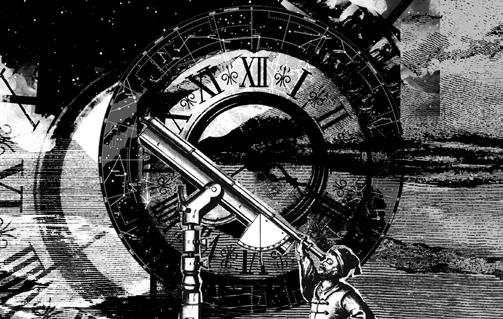
The self-reflection and introspection while recounting past failures and fears is believable and real. This verse — if you told me it was an excerpt from a novel, I would totally believe you. Thought has a power in his language to make you see and feel the subject. What’s happening is subtle, which makes it that much more powerful. Where maybe another emcee would have looked to bring more traditional wordplay, it’s the laying bare of the subject's soul, the frankness that within the context of telling this man’s story, over the course of the album, brings out the genius in the simplicity Thought displays. Oftentimes,
unlike in film, which wants you to see the depth visually and asks you to do so over a short period of time, novels work for you to see the depth through not only creating images in the mind but creating context for the reader to ponder and consider over time. Both ask you to ask questions, but with a book, a novel, it asks you to ingest and hold those questions longer as more is revealed, slowly. In the best ways, the album and the song do this.
28 black thought
The follow-up and sequel to Undun, And Then You Shoot Your Cousin is even more abstract conceptually. As it continues the story of Stephens, it goes further into more experimental territory. Both of these albums are attempted by true geniuses and masters. The risk/reward of bringing an audience along when not all the breadcrumbs are laid out can be fortune and folly. After two decades of success, and displaying true mastery of the craft, it makes sense for artists as adventurous as The Roots and Thought as an emcee to test themselves and push these types of boundaries. A standout track, “The Unraveling” carries a common Thought device, the persona. It’s a first person account of the character experiencing death:
What did the thief say unto the hanging man?
"Here come the hounds, lay your burdens down in advance"
Redemption in the slow grind of chance
My Grandmother's Hands, the Pomp and Circumstance
Free at last, free at last, a different me at last
Scattered like an ash, or history that's passed
Came from nowhere, disappear just as fast
A life out of balance, a touch out of grasp
A time traveler headed to a night catches us
The final stop on the line for all passengers.
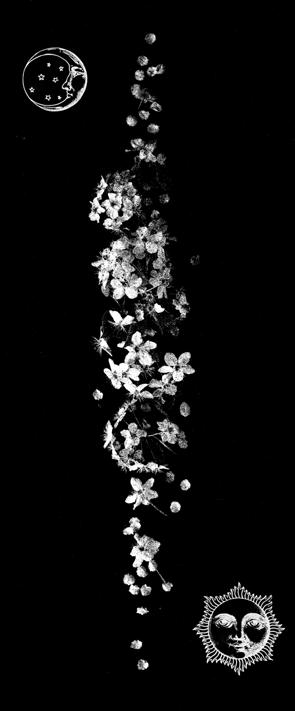
29 RAP LAUREATE • words beats & life
Thought’s poetry here is compact, poignant and vivid. When you’ve learned every trick, every move and even invented a few of your own, almost when you have nothing left to prove or display, you can get to a simplicity like this. Each line builds the crescendo leading to the unremarkable moment of the subject’s passing. The verse sounds solemn and sincere and it reads like the final paragraph of the last chapter.
This is what is most interesting about Thought and in particular the second half of his career, not only as the principal emcee in The Roots but also in his solo work — his opening up and expansion to delving into subjects through storytelling that weren’t necessarily missing from his catalog but weren’t what he was known for. Over time, with each successive year and album, he has demonstrated a greater skill in writing, creating and using story lyrically to unveil universal as well as personal truths and sometimes social commentary. All of this puts him in a different class of emcee. A final example of his talents is in the song “That Girl” on Glorious Game. The song could be an ode or a persona and it really is a first person love letter, to presumably his wife. The first verse is an account of their meeting and courtship:
I pulled a flower from the garden of pure Fleur de Jardins
Her bloodline mixed, the Philippines with New Orleans
The vibe made me think of Diahann Carroll in Claudine
Whoever couldn't see it, then so be it like I mean
A queen nightingale and her wings whisper the sky a tale
The sun and moon are her biggest fans, they send her mail
Skin caramel, a magnetism none could parallel
From Venus to Venezuel', they call her Miss Michelle
Her beauty truly a treasure, her laughter was a song
No way I could ever be right if lovin' her was wrong
There was times my character might have been less than strong She would leave, but she'd always come back where she belong.
30 black thought
A beautiful description of his love, it isn’t as detailed or sequential or even revealing in telling what the meeting was like, or where or even when, but it gives us a sense of a powerful encounter that is transformative. In the second verse he continues to describe the power of their relationship:
Some nights, I lay awake and feel all of my thoughts runnin'
I tally my regrets, upsets, and shortcomings
What have I been taught from 'em?
Some souls are sutured
And when you support someone, you invest in the future
Some days, it's apple cider, the next could be kombucha
Or celery through the juicer and tellin' me, "Do a booster"
She mighty, Aphrodite and never a true Medusa
She's never been too obtrusive long as we been exclusive
At first, love was elusive, this old heart was icy
The cold part: I thought the final wifey was unlikely
My lover friend, my spiritual twin, yeah, nothing like me
And rightfully so, I never met somebody more striking.
His recounting of his vulnerabilities, his fears and how this woman protects and heals him is touching and striking. Like in “Radio Daze,” Thought’s willingness to reveal his inner thoughts and monologue while crafting imagery and in a way that feels relatable is a mark of a gifted lyricist. The entire second verse could be read also as the healing power of the feminine. As he lists the various means by which this particular woman heals him, supports him, it can easily be read as an honoring of any woman. While he is giving us a glimpse into his personal relationship that at the same retains a level of privacy, he also shapes an archetype that is both familiar and powerful for us to reflect on.
Thought’s craft and style, his qualities that he flashed at every step of his career, only blossomed further with time. In the later stage of his career, rather than rest on his laurels or the security of having proved already that he was an emcee that could not be outbarred by virtually any other emcee on the planet, he pushed the boundaries of what he could do as a writer, and also expanded his palette and took risks in the subjects he would address, both politically and personally. Not only did he take on these challenges, he succeeded in meeting and conquering them. If we think about an artist with the range of catalog, the depth of catalog and displaying the consistency and array of subjects and writing that Thought has, all while continuing to bring raw lyricism and style to his songs, the list gets short very quickly.
Mikal Amin Lee
31 RAP LAUREATE • words beats & life
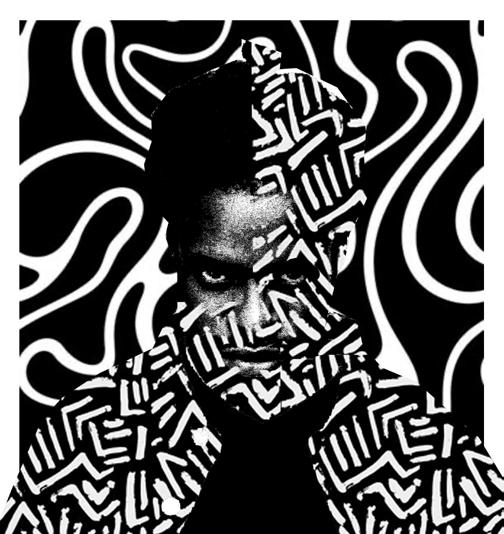
32 black thought
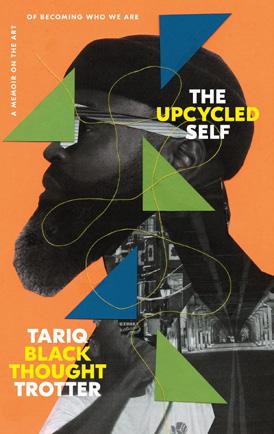
33 RAP LAUREATE • words beats & life
The Upcycled Self: A Memoir on the Art of Becoming Who We Are BOOK REVIEW
I, like so many of my peers, grew up listening to Tariq Trotter, better known as Black Thought, of the legendary Roots crew. Over the years he has shown on numerous occasions that he’s much more than one of the greatest MCs to walk the face of the earth, which quite frankly would be enough. Instead, he has tried his hand at acting in films like Brooklyn Babylon and also written a musical called Black No More. He has taught master classes at Carnegie Hall and, most notably, he and The Roots, led by Questlove, have been the official band for Late Night with Jimmy Fallon and The Tonight Show with Jimmy Fallon for the last 15 years. He is a modern-day Harlem Renaissance man or, as I like to say, a “Black of All Trades.” That being said, no one should be surprised that we can now add the title “author” to his already impressive CV.
The Upcycled Self: A Memoir on the Art of Becoming Who We Are is an in-depth look into the life of a prolific artist who has somehow remained mostly enigmatic. In many ways, the moniker “Black Thought” makes even more sense after reading his memoir. In every page we see a Black man come to grips with experiences uniquely American in some ways and specific to Black Americans and marginalized groups in the USA: experiences such as gun violence and murder, loss of home, overpunishment in schools, toxic masculinity and more. Thankfully, it’s not all doom and gloom. There’s love, hope, mentorship, exploration of the arts and, above all, resilience. Many moments spoke to me and lingered rent-free in my mind after reading it. There are two different chapters written from the point of view of his mother and a prominent male figure in his life. They are particularly interesting to me because, although I have listened to Black Thought’s music for 30 years, I realize now more than ever that I, we, don’t know him. We witness him reflect on his journey in a way we haven’t heard him do on record. The book as a whole is a reintroduction in some ways and a lifting of the veil in others. We are given a raw, honest look at a man who is as great at what he does as he is misunderstood and underrated in some regard.
34 BLACK THOUGHT
We tend to deify our favorite artists, leaders, athletes, politicians, etc. I have heard an old friend of mine compare us, Black people, to superheroes on more than one occasion; we are “real-life superheroes,” he would often say. While I agree to an extent, I sometimes feel a bit uneasy about that assessment because we are stripped of our humanity so often, viewed as “other” rather than human. When you have survived what we have historically and managed to accomplish the impossible despite everything the people in power throw at you, it’s easy to see why we could be or need to be seen as “superheroes” or “superhumans” — to inspire others, provide hope or stoke fear. So, being the nerd that I am, let’s run with that idea for a second. If Black Thought was a superhero, he’d be none other than the Dark Knight himself, Batman. A working-class Batman, though, because he’s actually from the streets he defends. His wealth isn’t monetary like Bruce Wayne’s. His richness lies in his
experiences, his knowledge of self, history and the arts. Like the Caped Crusader, both of his parents were murder victims and that trauma and so many other experiences, including the love around him, eventually led him to become more, when he could have settled for less. And lastly, like the world’s greatest detective in the Justice League, Trotter is the one his peers fear most when it comes to his craft.
The Upcycled Self allows us to finally see the mortal man under the mask. Rather than diminish his greatness, it adds to it and will likely inspire others on their odyssey. To quote Mr. Trotter, “You have to commit and ride it out. You don’t always determine the schedule and timing of your breakthrough. All that’s in control is your commitment to your dream.”
stan "substantial" Robinson
35 RAP LAUREATE • words beats & life
You have to commit and ride it out. You don’t always determine the schedule and timing of your breakthrough.
All that’s in control is your commitment to your dream “
tariq luqmaan totter
“ BLACK THOUGHT
36
BLACK THOUGHT

Our mission at Words Beats & Life is to transform individual lives and communities through Hip-Hop culture in all its forms.
instagram.com/wordsbeatsandlife
twitter.com/wordsbeatslife
facebook.com/WordsBeatsLife
youtube.com/wordsbeatsandlife
twitch.tv/wordsbeatsandlife



















